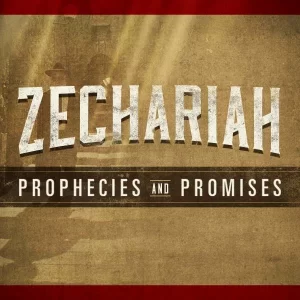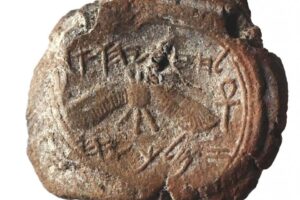Zechariah’s Distinctive Messiah Prophecies

Zechariah’s book of writings and prophecies are classified as a “Minor Prophet” in some Old Testament and Tenakh Bibles, yet the book bearing his name holds some of the most specific details of any prophetic book in the Scriptures.[1] Adding credibility to the Gospels, Zechariah’s book gives validity to a number of Messiah prophecies.
Genealogies of Matthew and Luke list the lineage of Jesus as a descendant of King David, both including Zerubbabel, son of Shealtiel, son of King Jeconiah, who was the last sitting king of Israel. Zechariah further predicted that Zerubbabel would lay the foundation for the rebuilding of the Temple.[2]
On the timeline of history, the Book of Zechariah was written during the Persian Empire under the reign of King Darius reckoned to 522–486 BC.[3] At that time, the Jews were receiving back freedoms taken away during their captivity under the rule of Babylon.[4]
Biblical Books of Ezra and Haggai provide extensive details of Zerubbabel’s efforts under three rulers to rebuild the Temple in Jerusalem destroyed by Nebuchadnezzar’s army.[5] From Abraham to Moses to David and the many prophets thereafter, Messiah prophecies built upon each other over time revealing more specifics.[8]
Prophecies in the form of visions and oracles came to Zechariah with some being very straightforward and specific while others were more challenging to interpret. In one of the most specific, straightforward of any Messiah prophecy, Zechariah foretold how the Messiah would come to Jerusalem riding on a colt foal donkey , an unridden male under a year old:[9]
Zech 9:9 “”Rejoice greatly, O daughter of Zion! Shout, O daughter of Jerusalem! Behold, your King is coming to you; He is just and having salvation, Lowly and riding on a donkey, a colt, the foal of a donkey.”” (NKJV) [10]
Branch prophecies were issued by three prophets during the span of some 200 years. Before Jerusalem was destroyed by King Nebuchadnezzar, Isaiah issued a Branch prophecy and during the Babylonian Captivity, Jeremiah delivered two more Branch prophecies.
After the Babylonian captivity during rule of the Persian Empire, twice Zechariah issued Branch prophecies. One prophecy confirmed the identity of “My Servant” in Isaiah’s parashah prophecy is the Branch:
Zech 3:8 “…For behold, I am bringing forth My Servant the BRANCH.”(NKJV)
Zech 6:12-13 “…Thus says the LORD of hosts, saying: ‘Behold, the Man whose name is the BRANCH! From His place He shall branch out, And He shall build the temple of the LORD; Yes, He shall build the temple of the LORD. He shall bear the glory, And shall sit and rule on His throne; So He shall be a priest on His throne, And the counsel of peace shall be between them both.’” (NKJV)
Christianity views Branch prophecies to be foretelling the Messiah agreeing with Jewish sage Rabbi Maimonides.[11] Sage Rabbi Rashi discerned the Branch or Shoot prophecies of Zechariah to be about Zerubbabel.[12]
Later in the Book of Zechariah appears another prophecy about a death in the House of David. Differing views on how the Messiah would be killed centers squarely on the meaning of one Hebrew word, daqar, translated in essentially two ways: “pierced” or “thrust through.”[13]
Zech 12:10 “…and they shall look unto Me because they have thrust him through; and they shall mourn for him, as one mourneth for his only son, and shall be in bitterness for him, as one that is in bitterness for his first-born.” (Jewish Publication Society)
Jewish Bibles translate daqar as “thrust him through” while traditional Christian Bibles translate daqar as “pierced” although it is not unanimous. Contemporary, simplified Bible translations are more closely aligned with the Jewish Bibles’ interpretation of daqar as stabbed or thrust through with a spear.[14]
“… then they will look on Me whom they pierced.”(New King James Version)
“They will look at me, whom they have stabbed.” (God’s Word Translation)
“They’ll then be able to recognize me as the One they so grievously wounded–that piercing spear-thrust!” (Message)
Rabbi Rashi agreed with other Jewish Sages that Zechariah 12:10 is a Messiah prophecy referring to Sukkah 52a.[15] A spit among Jewish sages had occurred when Rabbi Dosa questioned the meaning of the prophecy considered, up to that point, to be about the death of the “evil inclination.”
Nearly unanimous consensus among Jewish and Christian authorities alike recognize Zechariah 12:10 as a Messiah prophecy about the Messiah who would be killed. How the Messiah was to be killed is the only debate.
Zechariah’s prophecies may be fewer in number, but some are very specific and have major implications to prophesies of the Messiah. Were his prophecies fulfilled by Jesus of Nazareth?
Updated May 6, 2024.
This work is licensed under a Creative Commons Attribution-NonCommercial-NoDerivatives 4.0 International License.
REFERENCES:
[1] Jewish Publication Society (JPS) translation. 1917. Benyamin Pilant. 1997. <http://www.breslov.com/bible> NET Bible (NET) translation. <https://net.bible.org>
[2] I Chronicles 3:17-19; Zechariah 4:6-10; Matthew 1:1-16; Luke 3:23-38. CR Ezra 3:2, 8, 4:2-3, 5:2; Haggai 1:1, 14, 2:20-23. Dolphin, Lambert. “The Genealogy from Adam to Jesus Christ” Idolphin.org. 2011. <http://ldolphin.org/2adams.html>
[3] Zechariah 1:1. NetBible.org. Footnote #2. <http://classic.net.bible.org/bible.php?book=Zec&chapter=1#n2> “Darius I.” EncyclopediaBrittanica. 2022. <https://www.britannica.com/biography/Darius-I>
[4] Zechariah 1:1.
[5] Ezra 1-7; Haggai 1-2.
[6] Edersheim, Alfred. The Life and Times of Jesus the Messiah. Book II, Chapter 4. 1883. Philogos.org. <https://philologos.org/__eb-lat>
[7] Josephus, Flavius. Antiquities of the Jews. Trans. and commentary. William Whitson. The Complete Works of Josephus. 1850. Book XI, Chapter III.8 and IV.1-2, 7. <http://books.google.com/books?id=e0dAAAAAMAAJ&printsec=frontcover&source=gbs_ge_summary_r&cad=0#v=onepage&q&f=false>
[8] Genesis 41:1-14; Numbers 24:15-17; 2 Samuel 12:1-13; 1 Kings 20:35-42; Psalms 78:1-3; Daniel 2:27-28, 4:4-10, chapters 8 & 10; Isaiah chapter 5; Hosea 12:10.
[9] Complete Jewish Bible with Rashi commentary. Zechariah 9:9. Rash commentary. https://www.chabad.org/library/bible_cdo/aid/16213/showrashi/true> “Understanding Donkey Behavior.” The Donkey Sanctuary. 2018. <https://www.thedonkeysanctuary.org.uk/sites/sanctuary/files/document/142-1404405754-donkey_health_and_welfare_19.pdf>
[10] Matthew 21:1-8; Luke 19:29-36; John 12:12-16. “Zechariah Texts Quoted in the New Testament Regarding Jesus’ Ministry.” ESV.org. 2020. <https://www.esv.org/resources/esv-global-study-bible/chart-38-01>
[11] Maimonides, “Letter to the South (Yemen)”. p 374. The Fifty-third Chapter of Isaiah According to the Jewish Interpreters. <https://books.google.com/books?id=YxdbAAAAQAAJ&pg=PP1&hl=en#v=onepage&q=advent&f=false>
[12] The Complete Jewish Bible – with Rashi Commentary. Zechariah 6:12 Rashi commentary. <http://www.chabad.org/library/bible_cdo/aid/63255/jewish/The-Bible-with-Rashi.htm> Plaut, Gunther. “Haggai, Zechariah and Malachi: Back in the Land.” MyJewishLearning.com. n.d. <http://www.myjewishlearning.com/texts/Bible/Prophets/Latter_Prophets/The_12_Minor_Prophets/Haggai_Zechariah_Malachi.shtml>
[13] “daqar.” Net.bible.org. Hebrew text. <http://classic.net.bible.org/search.php?search=hebrew_strict_index:01856> Sapir, Avinoam. LSI Laboratory for Scientific Interrogation, Inc. n.d. <http://www.lsiscan.com/index.htm> “SCAN – Scientific Content Analysis (Statement Analysis).” Advanced Polygraph. 2011. <http://www.advancedpolygraph.com.au/scan.htm> “Introduction to Text Analysis: About Text Analysis.” Duke University | Libraries. 2017. <https://guides.library.duke.edu/text_analysis> “What Is the Definition of Textual Analysis?” Reference.com. 2018. <https://www.reference.com/education/definition-textual-analysis-a95087916fcb24cb> Pfarrer, Mike “What is content analysis?” University of Georgia | Terry College of Business. 2012. <http://www.terry.uga.edu/management/contentanalysis>
[14] Contemporary English Verson; Good News Translation; God’s Word translation; Zechariah 12:10. BibleHub.com. 2020. <https://biblehub.com/zechariah/12-10.htm> The Message; Bible in Basic English. Zechariah 12:10. NetBible.org. 2020. <http://classic.net.bible.org/verse.php?book=Zec&chapter=12&verse=10>
[15] Complete English Talmud. Halakhah.com. Tzee Zahavy trans. 2009. <https://www.halakhah.com/rst/moed/16b%20-%20Succah%20-%2029b-56b.pdf> Sukkah 52a. Sefaria.org. n.d. <https://www.sefaria.org/Sukkah.52a.1?lang=bi>

